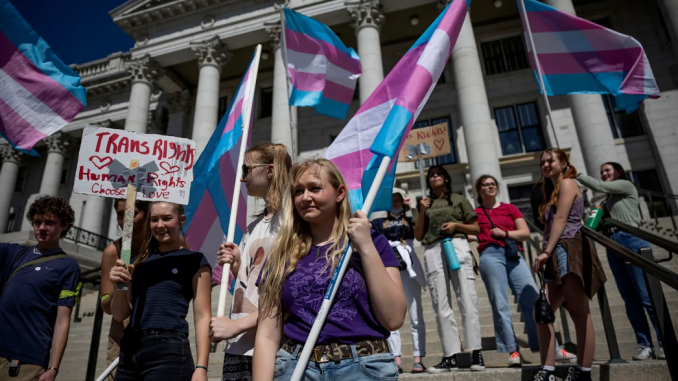
Throughout history (or at least up until about the past five minutes), even sexually libertine atheists have understood that defining people by what they want to do is dishonest. Gore Vidal and Michel Foucault are recent examples. Vidal once said, “There is no more such a thing as a homosexual person than there is a heterosexual person. These are behavioral adjectives.” Foucault lamented, “We are creating a hermaphrodism — a false species.”
Peter D. Beaulieu, in his book “A Generation Abandoned,” calls this degradation of human identity “the biggest lie.” “When we lie to ourselves,” says Mr. Beaulieu, by defining who we are by our “self-gratifying desires” rather than by our “good moral judgments,” we are imbibing what St. Augustine called the fantastica fornicato — the fornication of the mind.
Former lesbian activist and author of Syracuse University’s LGBTQ policies, Rosaria Butterfield, adds, “I really don’t like using the language that would suggest that there is such a thing as a gay person, or a lesbian person, or a bisexual person. … The sexual orientation identity system says [gay or transgender] is not ‘how’ you are … but rather is ‘who’ you are. … The move between ‘how’ and ‘who’ is vital. And the slippage is one paved by the [LGBTQ] movement. … It is vital that [we] stand firm that there are no such things as gay [or transgender] people. There are gay desires and gay sex … but people are all made in the image of God. The only ontological groundings … are biological sex. … Homosexuality is a verb, what people do, not a noun, who people are.”
Jim Garlow, author of “Re-Versed,” agrees: “No persons should ultimately define themselves by their sin or proclivities. We are not homosexuals or heterosexuals [or transgender]. We are the creation of God. We are ALL to be defined by the image of God.”
Glenn T. Stanton, director of family formation studies at Focus on the Family, adds, “People Are More than their sexuality. To identify people principally by their sexuality is to reduce people to their sexuality. We should all reject this with great force. A person’s inherent and undeniable value is rooted in his membership in humanity, not his particularity, sexual or otherwise. Full stop.”
Daniel C. Mattson, author of “Why I Don’t Call Myself Gay: How I Reclaimed My Sexual Reality and Found Peace,” states, “It is a mistake for anyone to say that he is gay, lesbian, or any other sexual identity label currently in vogue today. I view these as graffiti painted on the side of the Holy of Holies, which defaces human dignity and mocks the image of God, created as male and female.”
The British theologian John Stott concludes, “There is no such phenomenon as ‘a homosexual’ or ‘a heterosexual’: there are only people made in the image of God.”
Gay, lesbian, transgender and even straight labels explicitly embrace a broken ontology and anthropology — a lie — that dumbs down our identity to little more than our appetites, passions and drives. The key question, however, remains: Are we the imago Dei, or are we the imago dog? Is our identity more than what we are inclined to do? Are we “behavioral adjectives,” or are we nouns? Are we human beings, or are we animals?
Eight out of 10 Americans agree with the president’s executive orders because we intuitively understand that the definition of a man and woman — of a human being — hangs in the balance, and we know in our hearts of hearts, in our soul, that in comparison, nothing but this definition matters and that everything else hinges on the answer.
• Everett Piper (dreverettpiper.com, @dreverettpiper), a columnist for The Washington Times, a former university president and a radio host. He is the author of “Not a Daycare: The Devastating Consequences of Abandoning Truth” (Regnery). He can be reached at epiper@dreverettpiper.com.

